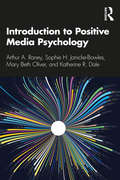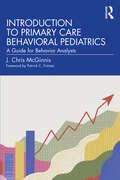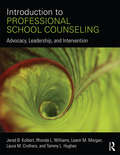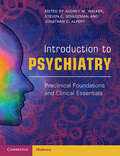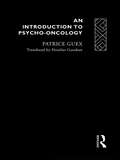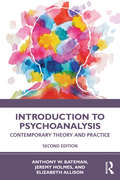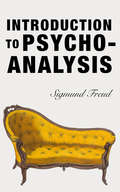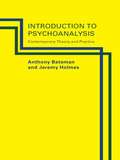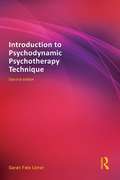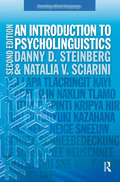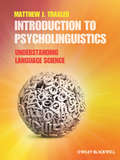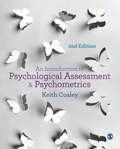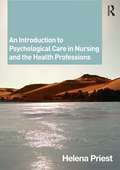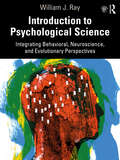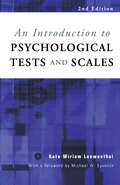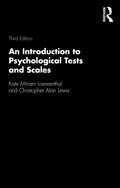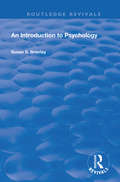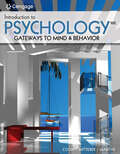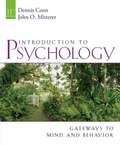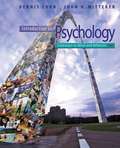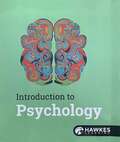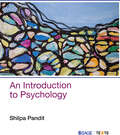- Table View
- List View
Introduction to Positive Media Psychology
by Arthur A. Raney Sophie H. Janicke-Bowles Mary Beth Oliver Katherine R. DaleIntroduction to Positive Media Psychology summarizes and synthesizes the key concepts, theories, and empirical findings on the positive emotional, cognitive, and behavioral effects of media use. In doing so, the book offers the first systematic overview of the emerging field of positive media psychology. The authors draw on a growing body of scholarship that explores the positive sides of media use, including fostering one’s own well-being; creating greater connectedness with others; cultivating compassion for those who may be oppressed or stigmatized; and motivating altruism and other prosocial actions. The authors explore these issues across the entire media landscape, examining the ways that varying content (e.g., entertainment, news) delivered through traditional (e.g., film, television) and more recent media technologies (e.g., social media, digital games, virtual reality) can enhance well-being and promote other positive outcomes in viewers and users. This book serves as a benchmark of theory and research for current and future generations of advanced undergraduate students, graduate students, and scholars in communication, psychology, education, and social work.
Introduction to Primary Care Behavioral Pediatrics: A Guide for Behavior Analysts
by J. Chris McGinnisThis book is a comprehensive yet practical guide to the practice of primary care behavioral pediatrics for behavior analysts.Practitioners of this subspecialty work collaboratively with caregivers, educators, pediatricians, and pediatric specialists to bring about success for primarily neurotypical children experiencing difficulties with everything from sleep and cooperation to attention, anxiety, and toileting. This book reviews the historical and theoretical foundations of the subspecialty and provides practical guidance for problem conceptualization, assessment, case formulation, treatment planning, science-based behavioral treatment, caregiver treatment adherence, multidisciplinary collaboration, and ethical practice.A cornerstone for the field, Introduction to Primary Care Behavioral Pediatrics is essential for graduate students, practitioners of behavior analysis, and anyone interested in science-based pediatric behavioral healthcare.
Introduction to Professional School Counseling: Advocacy, Leadership, and Intervention
by Leann M. Morgan Laura M. Crothers Rhonda L. Williams Jered B. Kolbert Tammy L. HughesIntroduction to Professional School Counseling: Advocacy, Leadership, and Intervention is a comprehensive introduction to the field for school counselors in training, one that provides special focus on the topics most relevant to the school counselor's role and offers specific strategies for practical application and implementation. In addition to thorough coverage of the ASCA National Model (2012), readers will find thoughtful discussions of the effects of trends and legislation, including the Every Student Succeeds Act (ESSA), Response to Intervention (RtI), and School-Wide Positive Behavioral Intervention and Support (SWPBIS). The text also provides a readers with an understanding of how school counselors assume counseling orientations within the specific context of an educational setting. Each chapter is intensely application oriented, with an equal emphasis both on research and on using data to design and improve school counselors' functioning in school systems. Available for free download for each chapter: PowerPoint slides, a testbank of 20 multiple-choice questions, and short-answer, essay, and discussion questions.
Introduction to Psychiatry: Preclinical Foundations and Clinical Essentials
by Audrey M. Walker Steven C. Schlozman Jonathan E. AlpertThe current global crisis in mental health has seen psychiatry assume an increasingly integral role in healthcare. This comprehensive and accessible textbook provides an evidence-based foundation in psychiatry for medical students and serves as an excellent refresher for all mental health professionals. Written by medical school faculty and experts in the field, with comprehensive coverage from neurobiology to population health, this essential textbook is an invaluable guide to the evaluation, treatment and current understanding of the major disorders in psychiatry. The book introduces the basics of clinical assessment and all major modalities of evidence based treatment, along with topics often not covered adequately in textbooks such as gender and sexuality, and global mental health. Chapters are complemented by easy to navigate tables, self-assessment questions, and a short bibliography of recommended reading. An essential resource for medical students, trainees, and other medical professionals seeking a clear and comprehensive introduction to psychiatry.
An Introduction to Psycho-Oncology
by Patrice GuexCancer is extremely common and in many situations a truly frightening disease, but for too long the psychological aspects and effects have been ignored. An Introduction to Psycho-Oncology deals in a clear and simple manner with the reactions of cancer patients to their illness, and the ways in which they can be helped. In the context of a multidisciplinary approach that takes account of medical treatments as well as psychological interventions, Guex offers suggestions for better ways of communicating so as to provide a therapeutic partnership between carer and client.
Introduction to Psychoanalysis: Contemporary Theory and Practice
by Anthony W. Bateman Jeremy Holmes Elizabeth AllisonWhat is psychoanalysis? Is it relevant to today’s mental health crisis? How can psychoanalysis help people suffering from psychological distress and illness? This vital new book examines how psychoanalysis has changed since its inception, and how it has adapted to the needs and concerns of 21st-century mental health professionals and patients. The first part of this book provides a concise and unbiased account of the origins of psychoanalysis, and the theories which characterise the main post-Freudian schools – neo-Freudian, Kleinian, interpersonal, self-psychological, Lacanian – and the ways in which they agree and diverge. The second part uses clinical illustrations to examine the practicalities of psychoanalytic technique in the consulting room – assessment, free association, dream analysis, transference, and counter-transference. Whatever their allegiance or role, mental health professionals – psychologists, psychiatrists, social workers, child mental health professionals, mental health nurses – need to be conversant with the strengths, relevance, and limitations of the psychoanalytic approach. This book provides an indispensable, up-to-date, and accessible account of psychoanalysis today. Shaped throughout by considering the viewpoint of an interested 21st-century reader, it is of great interest to psychoanalysts and related mental health professionals, as well as students and all those interested in the treatment of mental health.
Introduction to Psychoanalysis: A History Of Psychoanalytic Theory, Treatment And Therapy (hardcover) (World Literature Ser.)
by Sigmund FreudOriginally a set of lectures given by Sigmund Freud 1915-1917, Introduction to Psychoanalysis is now not only widely translated and popular, but also culturally significant. The 28 lectures offer Freud&’s views of the unconscious and the basis of psychoanalysis as we know it today. These conversational-style lectures are broken into three parts, beginning with Freudian slips, moving to dream theory, and then neuroses, and in them Freud successfully presents his ideas as firmly grounded in the everyday experience.
Introduction to Psychoanalysis: Contemporary Theory and Practice
by Jeremy Holmes Anthony BatemanThe need for a concise, comprehensive guide to the main principles and practice of psychoanalysis and psychoanalytic psychotherapy has become pressing as the psychoanalytic movement has expanded and diversified. An introductory text suitable for a wide range of courses, this lively, widely referenced account presents the core features of contemporary psychoanalytic theory and practice in an easily assimilated, but thought-provoking manner. Illustrated throughout with clinical examples, it provides an up-to-date source of reference for a wider range of mental health professionals as well as those training in psychoanalysis, psychotherapy or counselling.
Introduction to Psychodynamic Psychotherapy Technique
by Sarah Fels UsherIntroduction to Psychodynamic Psychotherapy Technique is a revised edition of the popular technical guide to the conduct of psychodynamic psychotherapy written by Sarah Fels Usher, published in 1993. In her thoroughly updated book, the author takes the student from the very beginning through to the end of the processes involved in using psychodynamic psychotherapy as a method of understanding and treating patients. Introduction to Psychodynamic Psychotherapy Technique offers explanations of how psychoanalytic/psychodynamic theory underwrites the technique, and demonstrates how the technique follows from the theory in a clear and accessible style. Each chapter is organized around the psychoanalytic concepts of transference and counter-transference, demonstrating how these concepts bring the work together. New material includes a chapter devoted to working with patients’ defenses, an in-depth look at the emotions on both sides during termination, and a chapter on the experience of supervision, all accompanied by lively clinical examples. The book is unique in that it is written from the point of view of the student, highlighting the difficulties they may encounter in practice and offering concrete suggestions for technique. Introduction to Psychodynamic Psychotherapy Technique will be of interest to psychoanalysts, psychotherapists, psychiatric residents, graduate psychotherapy students and social work students.
An Introduction to Psycholinguistics (Learning about Language)
by Danny D. Steinberg Natalia V. SciariniLearning About Language is an exciting and ambitious series of introductions to fundamental topics in language, linguistics and related areas. The books are designed for students of linguistics and those who are studying language as part of a wider course. Cognitive Linguistics explores the idea that language reflects our experience of the world. It shows that our ability to use language is closely related to other cognitive abilities such as categorization, perception, memory and attention allocation. Concepts and mental images expressed and evoked by linguistic means are linked by conceptual metaphors and metonymies and merged into more comprehensive cognitive and cultural models, frames or scenarios. It is only against this background that human communication makes sense. After 25 years of intensive research, cognitive-linguistic thinking now holds a firm place both in the wider linguistic and the cognitive-science communities.An Introduction to Cognitive Linguistics carefully explains the central concepts of categorizaÂtion, of prototype and gestalt perception, of basic level and conceptual hierarchies, of figure and ground, and of metaphor and metonymy, for which an innovative description is provided. It also brings together issues such as iconicity, lexical change, grammaticalization and language teaching that have profited considerably from being put on a cognitive basis.The second edition of this popular introduction provides a comprehensive and accessible up-to-date overview of Cognitive Linguistics: Clarifies the basic notions supported by new evidence and examples for their application in language learning Discusses major recent developments in the field: the increasing attention paid to metonymies, Construction Grammar, Conceptual Blending and its role in online-processing. Explores links with neighbouring fields like Relevance Theory Uses many diagrams and illustrations to make the theoretical argument more tangible Includes extended exercises Provides substantial updated suggestions for further reading.
Introduction to Psycholinguistics
by Matthew J. TraxlerThis textbook offers a cutting edge introduction to psycholinguistics, exploring the cognitive processes underlying language acquisition and use. Provides a step-by-step tour through language acquisition, production, and comprehension, from the word level to sentences and dialogue Incorporates both theory and data, including in-depth descriptions of the experimental evidence behind theories Incorporates a comprehensive review of research in bilingual language processing, sign language, reading, and the neurological basis of language production and comprehension Approaches the subject from a range of perspectives, including psychology, linguistics, philosophy, computer science, neurology, and neurophysiology Includes a full program of resources for instructors and students, including review exercises, a test bank, and lecture slides, available online at www.wiley.com/go/traxler
An Introduction to Psychological Assessment and Psychometrics
by Keith CoaleyIn An Introduction to Psychological Assessment and Psychometrics, Keith Coaley outlines the key ingredients of psychological assessment, providing case studies to illustrate their application, making it an ideal textbook for courses on psychometrics or psychological assessment.<P><P> New to the Second Edition:<P> * Includes occupational and educational settings<P> * Covers ethical and professional issues with a strong practical focus<P> * Case study material related to work selection settings <P> * End of chapter self-assessments to facilitate students’ progress<P> * Complaint with the latest BPS Certificate of Testing curriculum
An Introduction to Psychological Care in Nursing and the Health Professions
by Helena PriestCaring is at the core of what nurses and other health professionals do. But caring encompasses more than simply looking after people’s physical health needs. People requiring any health service will have psychological needs that affect their feelings, thoughts, and behaviour. Good psychological care can even help improve physical health outcomes. An Introduction to Psychological Care in Nursing and the Health Professions explains and promotes the importance of psychological care for people when they become physically ill, giving a sound theoretical basis to ensure care is evidence-based. It encourages the reader to think about the effects of illness and disability on patients, and to understand what can be done to identify and minimise any difficulties they might be experiencing in these areas. The chapters cover: the meaning and elements of care and holistic care; a model of psychological care in practice; the personal qualities and skills of carers that best underpin psychological care delivery, and how these might be enhanced; the knowledge needed for effective psychological caregiving; psychological care as it might be practised in a range of health care settings. This text contains key learning points, practical activities, reflective exercises and case illustrations. It is ideal for student and practising nurses, and health professionals who would like to improve their care for patients in this essential area.
Introduction to Psychological Science: Integrating Behavioral, Neuroscience and Evolutionary Perspectives
by William J. RayIntroduction to Psychological Science provides students with an accessible, comprehensive, and engaging overview of the field of scientific psychology. It expertly incorporates a variety of perspectives ranging from neuroscience to cultural perspectives at an introductory level. Ray brings together cutting-edge research from traditional psychological literature to modern, evolving perspectives, and creates a unified approach by focusing on three core themes: Behavior and Experience: an analysis of behavior and experiences observed across a variety of everyday life situations. Neuroscience: an examination of psychological experiences through neuroscience lens ranging from genetic/epigenetic to cortical networks as related to psychology. Evolutionary/Human Origins: an exploration of broader scientific questions by examining psychological processes from the perspective of human and cultural history. Through these themes, the book delves into topics like social processes, psychopathology, stress and health, motivation and emotion, developmental sequences, and cognitive functions such as memory, learning, problem solving, and language. Throughout it helps students to understand the nature of psychological science by addressing common myths and misconceptions in psychology, showing how psychological science can be applied to everyday life and how new research can be created. Additionally, this student-friendly book is packed with pedagogical features, including "concept checks" to test reader knowledge, "extensions" features which show how to apply knowledge, and a comprehensive glossary. Reflecting the latest APA Guidelines concerning the essential elements of an introductory psychology course, this text is core reading for all undergraduate introductory psychology students.
An Introduction to Psychological Tests and Scales
by Kate Loewenthal Christopher Alan LewisIn its first edition this book successfully enabled readers, with little or no prior knowledge of computing or statistics, to develop reliable and valid tests and scales for assessment or research purposes. In this edition, the author has thoroughly updated the text to include new recent advances in computer software and provide information on relevant internet resources. The book contains detailed guidelines for locating and constructing psychological measures, including descriptions of popular psychological measures and step-by-step instructions for composing a measure, entering data and computing reliability and validity of test results. Advanced techniques such as factor analysis, analysis of covariance and multiple regression analysis are presented for the beginner.An Introduction to Psychological Tests and Scales provides a clear, concise and jargon-free primer for all those embarking in fieldwork or research analysis. It will be an invaluable tool for undergraduates and postgraduates in psychology and a useful text for students and professionals in related disciplines.
An Introduction to Psychological Tests and Scales
by Kate Miriam Loewenthal Christopher Alan LewisThis text is a vital resource for those with little or no prior knowledge of computing or statistics to aid in the development of reliable and valid tests and scales for assessment or research purposes. It serves as a clear, concise and jargon-free primer for all those embarking in fieldwork or research analysis. The book contains detailed guidelines for locating and constructing psychological measures, including descriptions of popular psychological measures and step-by-step instructions for composing a measure, entering data, and computing reliability and validity of test results. Advanced techniques such as factor analysis, analysis of covariance, and multiple regression analysis are presented for the beginner. This new edition has been revised throughout and includes updated statistical test procedures in line with the new version of SPSS and the inclusion of current academic articles. It serves as an invaluable resource for undergraduates and postgraduates across the behavioral and social sciences, as well as professionals in related disciplines, including those working in management and medical sciences.
An Introduction to Psychology (Routledge Revivals)
by Susan S. BrierleyOriginally published in 1921, this introduction to psychology includes chapters on the definitions and methods related to psychology; organism and environnment; and instinct and intelligence.
Introduction to Psychology: Gateways To Mind And Behavior (Mindtap Course List Series)
by Dennis Coon John Mitterer Tanya Martini<p>The text of choice at schools across the country, by an author who garners more accolades from instructors and students with each succeeding edition, INTRODUCTION TO PSYCHOLOGY: GATEWAYS TO MIND AND BEHAVIOR attracts-and holds-the attention of even difficult-to-reach students. Dennis Coon and new contributor John Mitterer have updated the proven-effective SQ4R learning system (Survey, Question, Read, Reflect, Review, Recite) by harnessing critical thinking to better help students understand psychology's broad concepts and great diversity of topics. Throughout every chapter, these active learning tools-together with the book's example-laced writing style, cutting-edge coverage of the field's new research findings, and superb new media resources-ensure that students will find the study of psychology fascinating, relevant, and above all, accessible.</p>
Introduction to Psychology: Gateways to Mind and Behavior
by Dennis Coon John O. MittererNIMAC-sourced textbook
Introduction to Psychology: Gateways to Mind and Behavior
by Dennis Coon John O. MittererPsychology Textbook
Introduction to Psychology: Gateways to Mind and Behavior (Thirteenth Edition)
by Dennis Coon John O. MittererCo-written by an author who garners more accolades and rave reviews from instructors and students with each succeeding edition, INTRODUCTION TO PSYCHOLOGY: GATEWAYS TO MIND AND BEHAVIOR, THIRTEENTH EDITION attracts and holds the attention of even difficult-to-reach students. The Thirteenth Edition's hallmark continues to be its pioneering integration of the proven-effective SQ4R learning system (Survey, Question, Read, Reflect, Review, Recite), which promotes critical thinking as it guides students step-by-step to an understanding of psychology's broad concepts and diversity of topics. Throughout every chapter, these active learning tools, together with the book's example-laced writing style, discussions of positive psychology, cutting-edge coverage of the field's new research findings, and excellent media resources, ensure that users find the study of psychology fascinating, relevant, and above all, accessible.
Introduction to Psychology: Gateways to Mind and Behavior (11th Edition)
by Dennis Coon John Otto MittererIn this new edition of his introductory text, Coon (author, editor, and former professor at Santa Barbara City College) presents 20 chapters that discuss the gamut of topics addressed by the discipline including the brain and behavior, life-span development, states of consciousness, conditioning and learning, memory, cognition, language and creativity, intelligence, motivation and emotion, gender and sexuality, stress and coping, psychological disorders, therapies, social behavior, culture, human relations, and behavioral statistics. Annotation (c)2003 Book News, Inc., Portland, OR (booknews.com)
Introduction to Psychology
by Hawkes Learning SystemsIntroduction to Psychology offers students a comprehensive guide to core psychological concepts. Aligned with APA learning outcomes, the course emphasizes disciplinary diversity and the skeptical habits of a scientific mind. It features engaging, interactive practice and contemporary, multi-modal learning that foster a meaningful exploration of a vast and growing field. <p><p>In a conversational tone, Introduction to Psychology leads students to a foundational and relevant understanding of psychology through a consistent focus on applying concepts in their own lives.
Introduction to Psychology
by Mcdougal LittellSome of the topics covered in this book include: the world of psychology, research in psychology, psychology & the brain, sensation, perception, consciousness, learning, memory and intelligence among others.
An Introduction to Psychology
by Shilpa PanditA comprehensive, inter-disciplinary foundational book on psychology with socio-cultural contexts and practical applications This textbook is specifically designed to provide foundational knowledge to students of psychology. It explains the basic principles of psychology in a clear and accessible manner. It uses examples drawn from real life to provide a context for the theories of psychology. The book is unique in the way it introduces the study of psychology in the context of Indian issues and culture. It integrates indigenous perspectives on topics such as yoga, cognition and health with conventional theories of psychology without compromising on scientific rigour. Each chapter is designed to engage the learners by presenting practical applications of theories as well as relevant stories from Indian and international media. These features along with recent research studies and possible future research questions in the field make Introduction to Psychology an indispensable manual for Indian students of psychology. Key Features: • Examples from the Indian context to make the content more relatable to students • Inter-disciplinary approach which relates psychology to allied subjects like sociology and cognitive sciences • Updated with information about current trends in research in the subject • Follows the curriculum of major Indian universities
